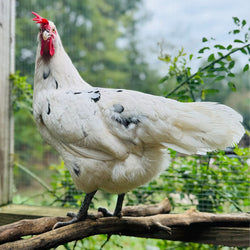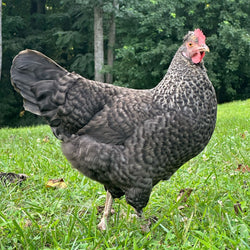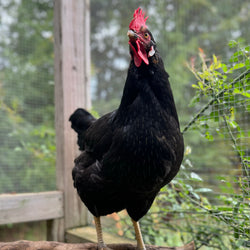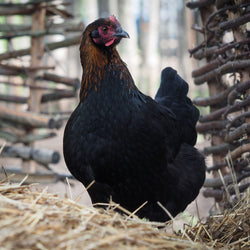page=50/--
Frequently Asked Questions
Here we answer the most commonly-asked questions about ordering, chicken care, and more.
A Guide to Chickens That Lay Colorful Eggs: Blue, Green, Pink, and Beyond
Chickens have long been cherished for their ability to provide fresh eggs, but did you know that not all eggs are the same color? While most people are familiar with white and brown eggs, there are breeds of chickens that lay a stunning array of colorful eggs. From blue to green, pink, olive, chocolate, and even speckled, these unique eggs add a splash of color to any egg carton. Let’s dive into the world of colorful egg layers and explore the breeds responsible for these beautiful hues. Chickens that lay blue eggs. Ameraucana - The Ameraucana is a popular breed known...
Read MoreWhat are "reportable diseases" when it comes to chickens?
Reportable diseases are chicken illnesses that are serious and communicable enough that in the U.S., you (and your vet) are required to report incidences to the National Animal Health Reporting System. Typically, these are illnesses that are very contagious, not only within your own flock, but may also travel from flock to flock in the air, or by wild birds and so on. They are difficult to control, often fatal, and may leave survivors as carriers. Below is an overview , a list of the reportable diseases in the US that affect chickens. You'll want a veterinarian's diagnosis to be...
Read MoreChick illnesses and issues (overview)
When you're worried your new baby chicks are ill, there are a number of things that could be responsible! Here's a quick overview of the most common illnesses, conditions, and issues that may cause you concern with your new baby chicks. It is not an exhaustive list. Please click on the links for more details about each. Illnesses and conditions common to baby chicks Aspergillosis, or brooder pneumonia - Primary symptoms of this illness are respiratory. Brooder too hot or too cold - If chicks are too hot, they'll be as far from the heat source as possible and may...
Read MoreChicken illnesses with respiratory symptoms (overview)
When your chicken is showing respiratory symptoms, there are a number of chicken illnesses that could be causing the problem. We know how worrisome it can be when a pet chicken is sick! Respiratory symptoms in chickens can present as wheezing/whistling/rattling breath, watery or bubbly eyes, gasping, sneezing, blocked nares/nostrils, coughing, panting, head shaking (to try to clear the nares/nostrils), swollen face/eyes (indicating some swelling in the sinus passages), coughing blood, choking, and darkened comb/wattles (from not enough air). We've included here a quick overview of the most common chicken illnesses that cause respiratory symptoms, but understand that each illness...
Read MoreWhat is the best location for a chicken coop? Top 10 Tips
There are many considerations to take into account when determining the best location for a chicken coop. Here are 10 tips that can help you find just the right spot: 1. Keep Your Coop Close to Your Home. If your coop is far away from your house, it's easy to lose interest in caring for your birds on a daily basis. There's no need to make chores more difficult! Therefore, position your coop close enough to the house for easy egg collection and daily care tasks. Yet far enough to keep any smells or flies away from the home. Also,...
Read MoreAll about Avian Influenza (AI)
The idea of "Bird Flu" (Avian Influenza), also known as AI, or Avian Flu, may strike fear in the minds of chicken keepers because of past outbreaks. When fear is involved, it is difficult to think rationally, so it's a good idea to get informed! Knowledge is power, right? The Centers for Disease Control remind us that "No animal or human infections with Asian H5N1 virus have occurred in the United States," and the USDA reminds us that in the United States, the 2022 strain of Eurasian H5 Avian Influenza has not infected any human. The major concern for backyard...
Read MoreWhat are mule ducks?
A "mule" duck is a sterile hybrid cross between a Muscovy and a Pekin. Because these two breeds have been genetically isolated for 50 million years, when you breed the two, you get some interesting results. Why cross these two breeds? We're glad you asked! In Europe and in Asia many mule ducks are produced because of their large size, quality liver, and reduced meat fat content. In fact, artificial insemination was developed in ducks because of the desire to produce mule ducks. If left to mate naturally, the fertility rate between Muscovies and Pekins is only 20-30%, but artificial...
Read MoreIs the floor surface important with ducks and geese?
Yes!--it is very important. As babies, ducklings and goslings need a surface they can grip until their leg muscles and hips are strong, just as with baby chicks. If the floor surface is too slippery, they can develop spraddle leg, a condition in which their hip muscles have not developed properly and they are not able to stand. To reduce the risk of spraddle leg, you will want to avoid slick flooring in incubator trays, transport carriers, and brooders. Also, do not use newspaper or cardboard flooring for the first week of their lives. The best bedding is wood shavings,...
Read More







"The Clubhouse" Coop
Easy to assemble and built to last, the Clubhouse Coop is the perfect starter coop for a small flock.











